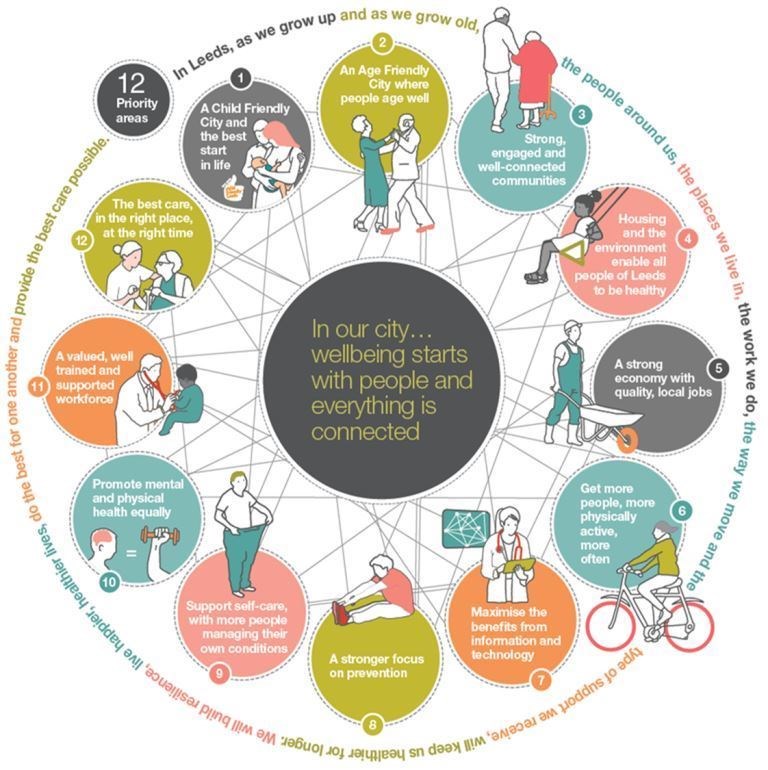
21 Dec 2018
Health and care leaders welcome report findings
Health and social care leaders across Leeds have welcomed the findings of a report which praises the strength of health and care services in the city.
Published today (Friday 21/12/2018) by the Care Quality Commission (CQC), the report outlines the strengths of the system in meeting the needs of local people and communities, and praises the partnership commitment to making Leeds the best city for health and wellbeing.
CQC looked at the experiences of local people as they flow through the health and care system, starting with what happens to help people stay at home, the experiences of those that require hospital treatment, through to the reablement support provided to older people to help them regain independence in their normal place of residence. It also looked at support available for older people living with dementia.
Councillor Rebecca Charlwood, Chair of Leeds Health and Wellbeing Board and Executive Member for Health, Wellbeing and Adults, said of the report findings:
“CQC have praised our approaches to preventative care and supporting self-management, which is helping improve the health of older people in Leeds, and helping them stay at home. This is in part thanks to a vibrant voluntary, community and social enterprise sector – funded by the Council and the Clinical Commissioning Group – which is helping reduce social isolation and loneliness. It also as a result of the positive work going on in relation to asset-based community development, helping to build connections between local people and empowering people to take action on things that are important to them
“The report also highly praises our city-wide governance and partnerships, recognising the strength of Elected Members and council officials working as equal partners with health services and with the voluntary, community and social enterprise sector.”
“Together we are committed to working in partnership with local people, to make Leeds the best city for health and wellbeing, and improve the health of the poorest the fastest. This report shows there is much good practice in Leeds, and that we are well-placed to achieve our ambitions.”
The report is published following a Local System Review, one of a number of targeted CQC reviews taking place across the country, which are looking at how hospitals, community health services, GP practices, care homes and homecare agencies work together to provide seamless care.
CQC came to Leeds because they were concerned that when older people attended hospital there were higher rates of admissions than the England average. When people were in hospital they were also concerned that they had a higher average length of stay.
Jim Barwick, Chief Executive, Leeds General Practice Confederation, added:
“Reducing length of stay in hospital requires a whole system approach, and the CQC have highlighted areas that we need to focus to improve this. For example, there is more we can do to utilise the invaluable role that GPs play in local communities, and strengthen their support in care homes, to improve the health and care of older people.”
Julian Hartley, Chief Executive of Leeds Teaching Hospital NHS Trust, said:
“We know that hospital is not always the most appropriate place for older people to be. We are committed to ensuring that patients are able to go home or to another care facility as soon as they ready and able to do so.”
“We know we need to improve our discharge processes for our patients. As a partnership, we have already been working on simplifying the discharge process to make it easier for patients and staff to understand, and help patients to be cared for in the right place for their individual needs every time. This in turn will help relieve pressure on our hospitals which are often incredibly busy.”
“When patients are discharged from hospital, teams across the city work together to ensure they are provided with the right support at home. This includes services such as reablement and Neighbourhood Teams, which helps people to recover and regain their independence more quickly. We receive great feedback about patients’ experiences of services like this so we know that it is important we make the most of what it can offer.”
Other areas that CQC highlighted as good practice in Leeds include the support available for people living with dementia, the investment in joined-up services in local communities, and the strong relationships between frontline workers helping put patients at the heart of health and care. However, they said Leeds needs to plan better to ensure it has the right workforce to take forward these approaches.
Councillor Rebecca Charlwood added:
“I welcome the external review, which highly praises our joined-up approach to driving forward improvements, and our priorities outlined in the Leeds Health and Wellbeing Strategy and the Health and Care Plan.”
“But there is clearly work to be done to improve services, which require a partnership response. Therefore, the Leeds Health and Wellbeing Board will use the findings of the report to challenge health and care services to deliver improvements for the people of Leeds.”
The report has been published on (21/12/2018), and can be found at: www.cqc.org.uk/local-systems-review - https://www.cqc.org.uk/sites/default/files/20181219_local_system_review_leeds.pdf (PDF)
ENDS
Notes to editors
The Leeds Health and Wellbeing Board is a group of senior representatives from organisations across Leeds, including Leeds City Council, the NHS, the third sector and Healthwatch. It exists to improve the health and wellbeing of people in Leeds and to join up health and care services.
For media enquiries contact:
Leeds City Council Communications team
communicationsteam@leeds.gov.uk